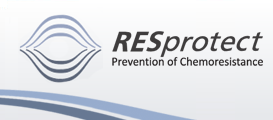|
Prevention of adriamycin-induced mdrl gene amplification and expression |

|

|

|
|
Page 1 of 7
Prevention of adriamycin-induced mdrl
gene amplification and expression in mouse leukemia cells by
simultaneous treatment with the anti-recombinogen bromovinyldeoxyuridine
Authors: Fahrig R.; Steinkamp-Zucht A.; Schaefer A.1
RESprotect GmbH - Prevention of Chemoresistance, Fiedlerstraße 34, D-01307 Dresden and 1Fraunhofer Arbeitsgruppe für Toxikologie und Umweltmedizin, Hamburg/Germany
Summary
The anti-recombinogenic substance (E)-5-(2-bromovinyl)-2 -deoxyuridine (BVDU) was tested for its ability to prevent adriamycin-induced mdrl gene amplification and expression in mouse leukemia cells in vitro.
F4-6 cells that were treated with stepwise enhanced doses of adriamycin
acquired resistance against adriamycin. While 20 ng/ml adriamycin
showed strong toxic effects in sensitive cells, the same dose was
tolerated at the end of the long-term experiment following treatment
with stepwise enhanced doses of adriamycin. In parallel experiments,
0.5 or 1 -deoxyuridine (BVDU) was tested for its ability to prevent adriamycin-induced mdrl gene amplification and expression in mouse leukemia cells in vitro.
F4-6 cells that were treated with stepwise enhanced doses of adriamycin
acquired resistance against adriamycin. While 20 ng/ml adriamycin
showed strong toxic effects in sensitive cells, the same dose was
tolerated at the end of the long-term experiment following treatment
with stepwise enhanced doses of adriamycin. In parallel experiments,
0.5 or 1  g/ml
BVDU was given together with adriamycin. BVDU prevented the formation
of resistance against adriamycin treatment. Using differential PCR, the
signal intensity of the mdrla-specific band appeared markedly
increased in adriamycin-resistant cells, while the signal intensities
of the adriamycin + BVDU-treated cells resembled the intensity ratio of
the untreated control cells. Beyond that, in resistant F4-6 cells
increased expression of mdr genes was demonstrated by Northern blot analysis. g/ml
BVDU was given together with adriamycin. BVDU prevented the formation
of resistance against adriamycin treatment. Using differential PCR, the
signal intensity of the mdrla-specific band appeared markedly
increased in adriamycin-resistant cells, while the signal intensities
of the adriamycin + BVDU-treated cells resembled the intensity ratio of
the untreated control cells. Beyond that, in resistant F4-6 cells
increased expression of mdr genes was demonstrated by Northern blot analysis.
Key words
gene amplification/leukemia/mouse cells/multidrug resistance/recombination
|






 -deoxyuridine (BVDU) was tested for its ability to prevent adriamycin-induced mdrl gene amplification and expression in mouse leukemia cells in vitro.
F4-6 cells that were treated with stepwise enhanced doses of adriamycin
acquired resistance against adriamycin. While 20 ng/ml adriamycin
showed strong toxic effects in sensitive cells, the same dose was
tolerated at the end of the long-term experiment following treatment
with stepwise enhanced doses of adriamycin. In parallel experiments,
0.5 or 1
-deoxyuridine (BVDU) was tested for its ability to prevent adriamycin-induced mdrl gene amplification and expression in mouse leukemia cells in vitro.
F4-6 cells that were treated with stepwise enhanced doses of adriamycin
acquired resistance against adriamycin. While 20 ng/ml adriamycin
showed strong toxic effects in sensitive cells, the same dose was
tolerated at the end of the long-term experiment following treatment
with stepwise enhanced doses of adriamycin. In parallel experiments,
0.5 or 1  g/ml
BVDU was given together with adriamycin. BVDU prevented the formation
of resistance against adriamycin treatment. Using differential PCR, the
signal intensity of the mdrla-specific band appeared markedly
increased in adriamycin-resistant cells, while the signal intensities
of the adriamycin + BVDU-treated cells resembled the intensity ratio of
the untreated control cells. Beyond that, in resistant F4-6 cells
increased expression of mdr genes was demonstrated by Northern blot analysis.
g/ml
BVDU was given together with adriamycin. BVDU prevented the formation
of resistance against adriamycin treatment. Using differential PCR, the
signal intensity of the mdrla-specific band appeared markedly
increased in adriamycin-resistant cells, while the signal intensities
of the adriamycin + BVDU-treated cells resembled the intensity ratio of
the untreated control cells. Beyond that, in resistant F4-6 cells
increased expression of mdr genes was demonstrated by Northern blot analysis.